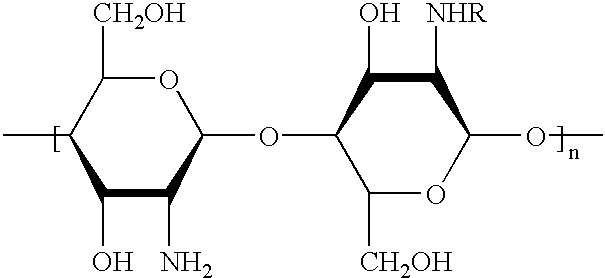Method for producing non-ionic tenside granulates
a technology of ionic tensides and granules, which is applied in the direction of detergent powders/flakes/sheets, detergent compounding agents, liquid soaps, etc., can solve the problems of low surfactant concentration, inadequate bulk density, and complex process
- Summary
- Abstract
- Description
- Claims
- Application Information
AI Technical Summary
Benefits of technology
Problems solved by technology
Method used
Image
Examples
example 1
[0130] Preparation of a readily soluble APG-SKET granulate. At 50.degree. C., 37.5 kg of a 40% strength aqueous solution of polyacrylate / methacryla-te (Sokalan CP 5) were mixed into 170 kg of a 50% strength cocoalkyl oligoglucoside paste (Glucopon.RTM. 600 CS UP), the mixture was adjusted to a pH of 7 with citric acid and granulated via a nozzle in fluidized-bed equipment for granulation drying from Glatt and simultaneously dried. About 100 kg of a dust-free and nonsticky granulate with a residual water content of 2% by weight were obtained in a particle size distribution of 0.2-1.6 mm. The product was still flowable even under compressive stress after days. 10 g of the granulate dissolved within 5 minutes in 250 ml of water at a temperature of 20.degree. C.
example 2
[0132] Preparation of a readily soluble APG-SKET granulate. At 50.degree. C., 37.5 kg of a 40% strength aqueous solution of polyacrylate / methacryla-te (Sokalan CP 5) were mixed into 70 kg of 50% strength cocoalkyl oligoglucoside paste (Glucopon 600 CS UP) and 50 kg of a mixture consisting of 35 kg of cocoalkyl oligoglucoside and 15 kg of C12 / 14-fatty alcohol, and granulated via a nozzle in equipment for granulation drying from Glatt and simultaneously dried. About 100 kg of a dust-free and non-sticky granulate with a residual water content of 2.5% by weight were obtained in a particle size distribution of 0.2-1.6 mm. The product was still flowable even under compressive stress after days. 10 g of this granulate dissolved within 5 minutes in 250 ml of water at a temperature of 20.degree. C.
examples 3 to 18
[0133] To prepare a readily soluble APG-SKET granulate, the following polymers were used in place of the polyacrylate / methacrylate:
[0134] (3) protein hydrolyzate powder (Gluadin WP),
[0135] (4) water-soluble wheat gluten,
[0136] (5) guarhydroxypropyltrimethylammonium chloride (Cosmedia Guar C 261; Cognis)
[0137] (6) polyaspartate (MW 20 000, Donlar)
[0138] (7) cyclodextrin
[0139] (8) dextrin
[0140] (9) carboxymethyldextran
[0141] (10) cationically modified cellulose (Polymer JR 400)
[0142] (11) polyglycol-polyamine condensation resin (Polyquart H 81; Cognis)
[0143] (12) polyhydroxycarboxylic acid, sodium salt powder (Hydagen F, Cognis)
[0144] (13) vinylpyrrolidone / vinyl acetate copolymer powder (Nasuna B; Cognis)
[0145] (14) guar flour powder (Cosmedia Guar U; Cognis)
[0146] (15) chitosan powder (Hydagen HCMF; Cognis)
[0147] (16) cationically modified protein hydrolyzate (Gluadin WQ; Cognis)
[0148] (17) polybeta-alanine / glutaric acid crosspolymer powder
[0149] (18) polyethyl glutamate powder
1TABLE...
PUM
| Property | Measurement | Unit |
|---|---|---|
| particle size distribution | aaaaa | aaaaa |
| particle size distribution | aaaaa | aaaaa |
| temperatures | aaaaa | aaaaa |
Abstract
Description
Claims
Application Information
 Login to View More
Login to View More - R&D
- Intellectual Property
- Life Sciences
- Materials
- Tech Scout
- Unparalleled Data Quality
- Higher Quality Content
- 60% Fewer Hallucinations
Browse by: Latest US Patents, China's latest patents, Technical Efficacy Thesaurus, Application Domain, Technology Topic, Popular Technical Reports.
© 2025 PatSnap. All rights reserved.Legal|Privacy policy|Modern Slavery Act Transparency Statement|Sitemap|About US| Contact US: help@patsnap.com



